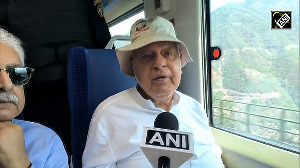A mass fan following or a large number of views on a YouTube channel can't possibly constitute 'credentials'.

A full front-page advertisement on June 26 in a pink paper said: 'Trust only the real experts: There are real as well as fake experts on the Internet. Spotting the difference between the two can be tricky. So, before you trust any self-proclaimed expert, know a little more about them. Hit Pause.'
It included a picture of blogger and educator Rachana Ranade (YouTube channel @CARachanaRanade).
The 18-second video accessed by scanning the QR code given in the ad did not yield any useful tips on how to discern a real expert.
I had positive memories from an early video of CA Rachana Ranade explaining IRR, CAGR and XIRR.
I visited her YouTube channel (4.44 million subscribers, 242 million views) where she described her objective as education on stock markets and financial concepts.
I also found details of the many educational courses on stock markets and mutual funds offered by her.
The interesting videos on her YouTube channel covered many investment-related topics. But I was unable to find details of any 'credentials' that the YouTube ad spoke about.
A mass fan following or a large number of views on a YouTube channel can't possibly constitute 'credentials'.
It also made me think whether YouTube was right in touting only 'credentials' as the right factor for distinguishing between real and fake experts.
All this should be seen against the backdrop of the elaborate regulatory framework within which an investment advisory professional in this country operates.
When I suggest a simple index fund on mass media, my advice is backed by my firm's credentials -- a Registered Investment Adviser (RIA) licence from the Securities & Exchange Board of India (Sebi).
If my firm (or I) derive any revenue I need to disclose it and the advice is circumscribed by many disclaimers: the client must stay invested for 10 years or more; past results don't guarantee future performance, etc.
The employees of an RIA firm need to have prescribed qualifications and minimum experience.
The firm must have minimum net worth and requisite infrastructure, follow a code of conduct, provide adequate disclosures on conflicts of interests, charge a reasonable fee, and be accountable under the regulations.
Investors have access to a grievance redressal machinery if they wish to complain against an RIA.
Ironically, these elaborate investor protection measures imposed on regulated entities have driven investors towards non-regulated entities.
One person who has pulled off admirably the twin roles of being a finfluencer while running an RIA firm (Finology Ventures) is Pranjal Kamra (YouTube channel @pranjalKamra, 5.3 million subscribers).
It appears to be doing a decent job, if the number of complaints on the Sebi SCORES platform (one, in his case) is treated as a proxy for compliance.
By this measure most RIAs are compliant as 78 per cent of them don't have a single complaint on the SCORES platform.
A handful of RIAs (9 per cent) account for 94 per cent of the complaints.
When I asked Pranjal why he chose to take a regulatory licence when other finfluencers haven't, he said he is in the game for the long term.
He knew regulations were bound to come someday, so he decided to be an early mover.
The credibility provided by an RIA licence helped him tremendously.
"I didn't want to become the monster I set out to destroy," he said.
On the difficulties he faces, he spoke about the very broad and over-prescriptive nature of the recent advertising code for RIAs.
He faces long delays in getting his social media posts, which are treated as advertisements, approved.
This puts him at a disadvantage against his non-regulated peers.
Nonetheless, he is determined to remain a regulated entity.
There is much to learn from Pranjal who took an RIA licence despite having millions of subscribers.
It puts in perspective the distasteful attempt, in the garb of a public interest ad, by YouTube to become the self-appointed arbiter of fake and real experts.
Truth be told, the space for non-regulated finfluencers has been created by the absence of regulator-driven education programmes in social media and the constraints faced by regulated entities due to over regulation.
The Mutual Funds Sahi Hai campaign showed the power of the media to educate investors.
Kamra's example demonstrates what can be achieved if finfluencers can be drafted into the regulatory ambit with complaints from investors serving as a control mechanism.
Harsh Roongta heads Fee-Only Investment Advisors LLP, a Sebi-registered investment advisor.
Feature Presentation: Ashish Narsale/Rediff.com</p












